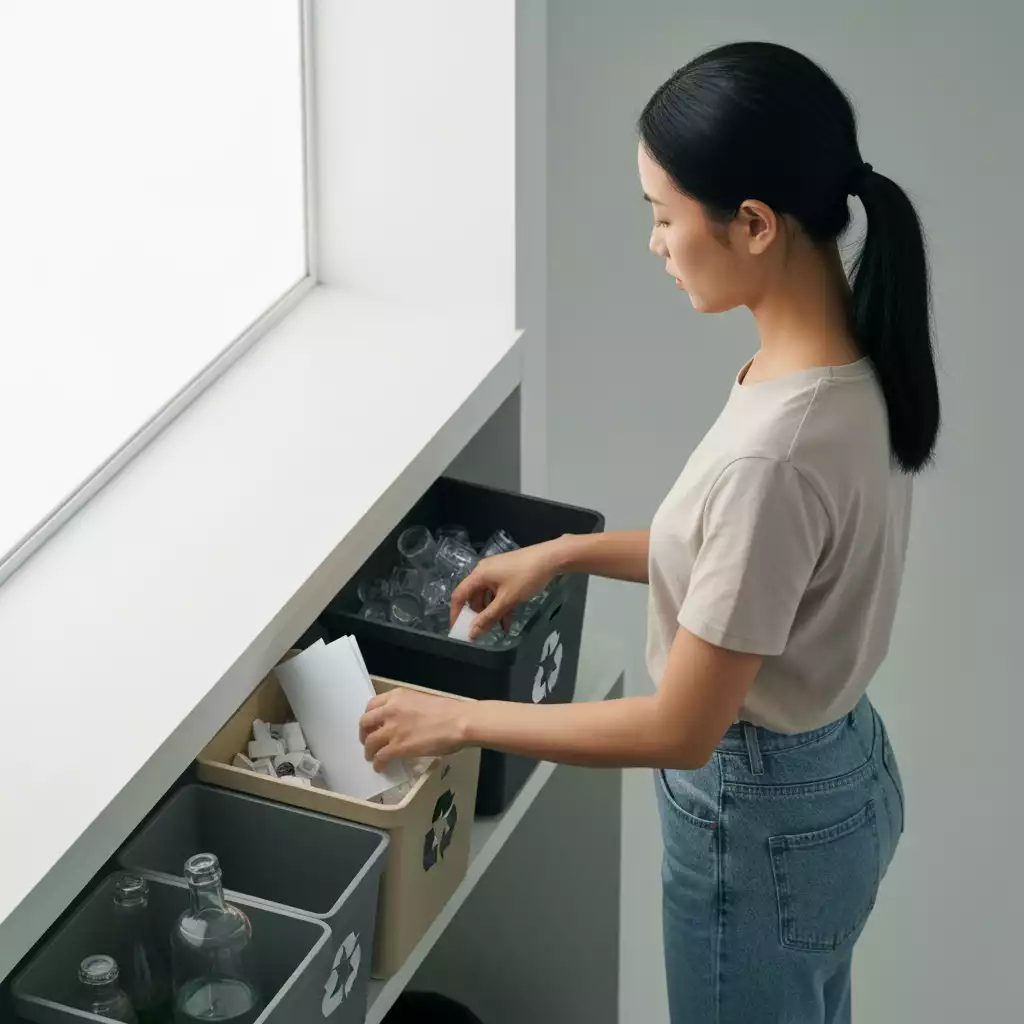The journey towards a zero waste lifestyle is more than just reducing trash; it’s about cultivating a mindset that values sustainability and resourcefulness. As you delve into this concept, you’ll find that every small change can contribute significantly to a healthier planet. Are you ready to explore the impactful principles of zero waste living?
What You Will Learn
- Zero waste living aims to send no waste to landfills, promoting sustainability and resourcefulness.
- Adopting the five key principles: Refuse, Reduce, Reuse, Recycle, and Rot is essential for a zero waste lifestyle.
- Reducing waste is crucial for conserving natural resources and combating climate change.
- Participating in challenges and community initiatives enhances motivation and builds a support network.
- Understanding the circular economy can empower informed purchasing decisions and promote sustainable practices.
Understanding the Zero Waste Lifestyle Concept
The concept of zero waste living is all about minimizing the waste we produce in our daily lives. It encourages us to rethink our habits and find ways to reduce, reuse, and recycle materials instead of disposing of them. By embracing zero waste principles, we can contribute to a healthier planet and a sustainable future.
When I first heard about zero waste living, I was intrigued! I realized that it’s not just about eliminating trash but fostering a mindset that values resources and reduces our environmental footprint.
What Does Zero Waste Living Mean?
Zero waste living means aiming to send no waste to landfills or incinerators. It’s about creating a lifestyle that consciously prioritizes sustainability and resourcefulness. This involves shifting our purchasing habits, opting for second-hand goods, and refusing single-use plastics.
- Reducing consumption by buying only what we need
- Reusing items and repurposing them creatively
- Recycling responsibly
- Composting organic waste to enrich soil
By focusing on these actions, we can significantly lessen our waste output. It’s a holistic approach that encourages us to be mindful of how our choices impact the environment. For more insights, the C40 Towards Zero Waste Accelerator Progress Report 2023 highlights global efforts in this area.

The Importance of Waste Reduction in Today’s World
Waste reduction is crucial in our current climate crisis. With landfills overflowing and pollution levels rising, we must take action to protect our planet. Reducing waste helps conserve natural resources, decreases greenhouse gas emissions, and promotes a healthier ecosystem.
- Conserves energy and water used in production
- Reduces pollution from waste disposal
- Encourages sustainable practices in communities
By committing to waste reduction, we not only help our environment but also inspire others to join the movement. It’s about creating a ripple effect that leads to meaningful change! Learn more about comprehensive strategies in the NYC Zero Waste Plan.
Key Principles of a Zero Waste Mindset
Adopting a zero waste lifestyle involves embracing several key principles that guide our actions. These principles help us navigate daily choices, making sustainability easier and more intuitive.
- Refuse: Say no to items you don’t need.
- Reduce: Minimize what you consume.
- Reuse: Find new purposes for items.
- Recycle: Sort and process materials correctly.
- Rot: Compost organic matter for soil health.
Each of these principles plays a vital role in achieving a zero waste lifestyle. By integrating them into our routines, we can make substantial progress towards a more sustainable future!
Influential Figures in the Zero Waste Movement
Many individuals have inspired the zero waste movement, leading by example and sharing their knowledge. These figures have made a significant impact on how we perceive waste and sustainability.
- Bea Johnson: Author of “Zero Waste Home” and a pioneer in the movement.
- Lauren Singer: Creator of “Trash Is for Tossers,” who advocates for sustainable living.
The contributions of these influencers have made it easier for others to adopt similar practices. Their stories are not just inspiring; they provide practical insights that can help anyone start their journey towards zero waste living.
Bea Johnson and Her Impact on Zero Waste Living
Bea Johnson is often considered the mother of the zero waste movement. Her book, “Zero Waste Home,” has become a go-to guide for those seeking to minimize their environmental impact. Through her personal journey, she showed that living a life with less waste is not only possible but also fulfilling!
Bea’s inspiration comes from her desire to create a sustainable family life. Her practical tips and engaging storytelling have empowered many to make the shift towards zero waste.
Lauren Singer: From Trash to Treasure with Trash Is for Tossers
Lauren Singer is another key figure in the zero waste movement, known for her blog “Trash Is for Tossers.” She started her journey after realizing how much waste she was producing and decided to make a change. Lauren shares her experiences through videos, showing how easy it can be to adopt a zero waste lifestyle!
Her ability to connect with a younger audience has helped spread zero waste ideas and make them more accessible. I love how she demonstrates that living sustainably doesn’t have to be complicated!
We Want to Hear From You!
What step are you most excited to take in your zero waste journey? Share your thoughts below:
Encouragement for Your Sustainable Path
As you embark on your zero waste journey, it’s crucial to remember that every step you take matters! Embracing progress over perfection allows you to focus on the changes you can make today, rather than getting overwhelmed by the big picture. Small but consistent actions can lead to significant impacts on both your life and the environment.

It’s easy to feel discouraged when you see the scale of waste produced daily, but every little bit counts! Celebrate your victories, no matter how small, and use them as motivation to keep moving forward. The goal is to create a lifestyle that feels manageable and fulfilling, not a burden.
Embracing Progress Over Perfection in Your Zero Waste Lifestyle
Striving for a zero waste lifestyle can feel daunting, but remember that it’s about progress! Here are some tips to help you stay motivated:
- Start with simple swaps, like using reusable bags instead of plastic.
- Set achievable goals that inspire you, such as reducing your waste by 25% this month.
- Reflect on your journey regularly and celebrate milestones.
- Connect with others who share your passion; it makes the process more enjoyable!
Keep in mind that setbacks are part of the journey. Embrace them as learning opportunities and keep pushing forward. Your commitment to reducing waste can inspire those around you, creating a ripple effect in your community!
Next Steps: Joining a Zero Waste Challenge or Initiative
One of the best ways to deepen your commitment to a zero waste lifestyle is by participating in challenges or initiatives. These can provide structure and community support, making the journey more enjoyable. Here are some popular options:
- 30-Day Zero Waste Challenge: A great way to kickstart your journey with daily tasks.
- Local Clean-Up Events: Get involved with your community while reducing waste.
- Social Media Campaigns: Share your journey online and connect with others.
- Zero Waste Workshops: Learn new skills and techniques to minimize waste.
Joining a challenge not only enhances your motivation but also allows you to meet like-minded individuals. Together, you can share ideas, tips, and support, making your sustainable path even more rewarding!
Understanding the Circular Economy and Its Benefits
The circular economy is a vital concept in the zero waste movement. It emphasizes the importance of redesigning our consumption patterns to minimize waste. Here are some key benefits of embracing a circular economy:
- Reduces the pressure on natural resources by recycling and reusing materials.
- Creates economic opportunities through sustainable business practices.
- Encourages innovation in product design and material usage.
- Helps combat climate change by decreasing waste and emissions.
Understanding this concept can empower you to make more informed choices about the products you buy and how you dispose of them. By supporting businesses that prioritize sustainability and adopting circular practices in your own life, you contribute to a healthier planet! The California Green Building Standards Code provides an example of how waste reduction is being integrated into building practices.
Frequently Asked Questions About Zero Waste Living
What is the main goal of zero waste living?
What are the five key principles of a zero waste mindset?
Why is waste reduction important today?
Who are some influential figures in the zero waste movement?
What is the circular economy and how does it relate to zero waste?
Final Thoughts on Living a Zero Waste Lifestyle
As you reflect on your journey towards a zero waste lifestyle, take a moment to appreciate the impact of your choices. Each decision you make can lead to a more sustainable future, both for yourself and for generations to come!
Reflecting on the Impact of Your Choices
Think about how your lifestyle changes have affected your life and the environment. By tracking your progress, you can see the tangible benefits of your efforts, which can be incredibly motivating!
Call to Action: Start Your Zero Waste Journey Today!
Ready to make a difference? Start your zero waste journey today! Every action counts, and together we can create a more sustainable world. Remember, it’s not about being perfect—it’s about making better choices that align with your values. Let’s embrace this challenge together and inspire others along the way!
Recap of Key Points
Here is a quick recap of the important points discussed in the article:
- Zero Waste Living: Aims to send no waste to landfills by reducing, reusing, and recycling materials.
- Key Principles: Follow the 5 R’s: Refuse, Reduce, Reuse, Recycle, and Rot.
- Importance of Waste Reduction: Helps conserve resources, decreases pollution, and promotes sustainable practices.
- Influential Figures: Bea Johnson and Lauren Singer have significantly shaped the zero waste movement, providing guidance and inspiration.
- Progress Over Perfection: Focus on small, manageable changes to create a sustainable lifestyle without feeling overwhelmed.
- Circular Economy: Emphasizes redesigning consumption patterns to minimize waste and supports sustainable business practices.
- Next Steps: Engage in challenges or initiatives to deepen your commitment and connect with a supportive community.
